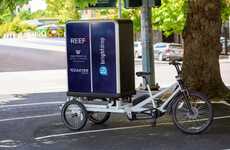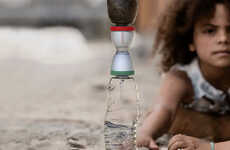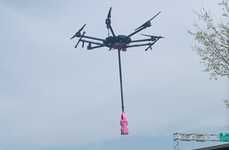NextDrop Uses SMS to Make Water Service More Reliable in India
Bianca — December 5, 2011 — Social Good
References: nextdrop.org & inc
Offering a solution to the problem of unreliable water service in India, NextDrop provides real-time updates on water availability via text message. Cell phones are already widely used in India -- according to MobiThinking, there are over 840 million mobile subscribers in India, or 70% of the population -- thus the social enterprise leverages this technology to alert subscribers in Hubli, India 30-60 minutes prior to piped water delivery.
"In addition, NextDrop uses crowd-sourcing to verify the accuracy of utility reports and create a feedback loop, introducing much needed visibility for engineers in the water utility," the website explains.
The infographic in the gallery illustrates the valvemen (utility employees who inform the NextDrop network via text when valves are opened), residents (who receive updates in real-time via text, and can verify accuracy if they choose), and engineers (who turn the data into an online dashboard leveraging Google Maps to track status and resolve issues as soon as possible).
The San Francisco-based social business was started by Anu Sridharan, a University of California, Berkeley grad. She and her team of seven other social entrepreneurs are testing NextDrop in Hubli, a town of one million where water is only available for a precious few hours every week or two. The social entrepreneur told Inc magazine that if the "humans as sensors" project works, the system could also be applied to electricity and other utilities.
Being a for-profit social enterprise, the monthly fee for NextDrop subscribers is five rupees, or about 10 cents. When first launching the social enterprise, Sridharan traveled to Hubli with other UC-Berkeley students to test the potential of the service. Out of 60 families in the pilot project, over 80% said they would be willing to pay to join NextDrop.
"In recent months, the service has expanded to more than 1,000 registered customers, 60 of whom are paying for the service," Inc says. "Sridharan has stationing herself in Hubli for the next few years to see if NextDrop can take that idea and turn into a full-fledged operation by 2013, servicing all of Hubli's residents—only a million, remember."
Contact Information
NextDrop website
NextDrop on Twitter
NextDrop on Facebook
"In addition, NextDrop uses crowd-sourcing to verify the accuracy of utility reports and create a feedback loop, introducing much needed visibility for engineers in the water utility," the website explains.
The infographic in the gallery illustrates the valvemen (utility employees who inform the NextDrop network via text when valves are opened), residents (who receive updates in real-time via text, and can verify accuracy if they choose), and engineers (who turn the data into an online dashboard leveraging Google Maps to track status and resolve issues as soon as possible).
The San Francisco-based social business was started by Anu Sridharan, a University of California, Berkeley grad. She and her team of seven other social entrepreneurs are testing NextDrop in Hubli, a town of one million where water is only available for a precious few hours every week or two. The social entrepreneur told Inc magazine that if the "humans as sensors" project works, the system could also be applied to electricity and other utilities.
Being a for-profit social enterprise, the monthly fee for NextDrop subscribers is five rupees, or about 10 cents. When first launching the social enterprise, Sridharan traveled to Hubli with other UC-Berkeley students to test the potential of the service. Out of 60 families in the pilot project, over 80% said they would be willing to pay to join NextDrop.
"In recent months, the service has expanded to more than 1,000 registered customers, 60 of whom are paying for the service," Inc says. "Sridharan has stationing herself in Hubli for the next few years to see if NextDrop can take that idea and turn into a full-fledged operation by 2013, servicing all of Hubli's residents—only a million, remember."
Contact Information
NextDrop website
NextDrop on Twitter
NextDrop on Facebook
Trend Themes
1. Real-time Updates - NextDrop provides real-time updates on water availability via text message, offering a disruptive innovation opportunity for businesses to leverage real-time technology in various industries.
2. Crowdsourcing - NextDrop uses crowd-sourcing to verify the accuracy of utility reports, creating a feedback loop and introducing visibility for engineers, opening up opportunities for disruptive innovation in crowd-sourcing.
3. Mobile Technology - NextDrop leverages the widespread use of cell phones in India to deliver water availability updates, showcasing the disruptive potential of mobile technology in improving service delivery.
Industry Implications
1. Utility Services - NextDrop's system can be applied to electricity and other utilities, representing a disruptive innovation opportunity in the utility services industry.
2. Smart Cities - NextDrop's use of real-time updates and crowd-sourcing can be applied to create smarter cities, facilitating the efficient management of resources and services.
3. Social Enterprises - NextDrop's model as a for-profit social enterprise demonstrates the disruptive potential of combining business objectives with a social impact, applicable to various social enterprise industries.
2.3
Score
Popularity
Activity
Freshness














